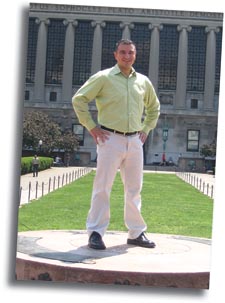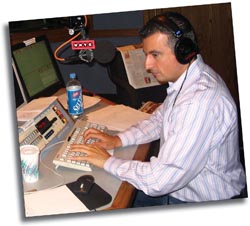|
|
 |
 |
 |
 |
|
FEATURESGood Morning, New YorkSoterios Johnson ’90 hosts NPR’s Morning Edition in New York By Elaine Machleder ’97J At 6 a.m., the first “Good morning, I’m Soterios Johnson” of the day reaches homes across metropolitan New York. For thousands of area residents, it’s the first voice they hear upon waking. Meanwhile, high in the city’s Municipal Building, Soterios Johnson ’90 is thinking about his listeners. This helps the New York host of National Public Radio’s Morning Edition figure out what his audience needs to know to begin the day. “He has the ability to make a connection with the listeners,” says WNYC news director John Keefe. “They see him as their friend. He’s the companion they wake up with in the morning. [And] he’s one of the nicest guys you’ll ever meet.”
Johnson grew up in small-town Highland Park, N.J., first visiting Columbia as a high school junior. “I fell in love with the College,” he recalls. “I loved the campus, loved that it was in New York City.” At first, his mother didn’t like the idea of his going to school in the city, but after seeing the campus, she liked its cohesive community — and strong iron gates. “It was a different time,” notes Johnson. “In 1986, when I started, there was a different perception of New York City.” Johnson majored in American history and finished one course shy of a psychology concentration. Professors James Shenton ’49 (“Ethnicity and Race”), Kenneth Jackson (“History of the City of New York”) and Dennis Dalton (“Political Theory”) had a great influence on Johnson. “Dalton brought issues to life and made them relevant to a 20-year-old,” he says. During his years living in Carman, Wien (then called Johnson) and Furnald, Johnson worked for WKCR, joining the news department during his first semester. Each week, he broadcast an evening news show as well as a morning classical music show, featuring a single composer on each show. One notable project Johnson worked on was a 20th anniversary retrospective of the 1968 Columbia demonstrations, for which Allen Ginsberg ’48 read a selection from his poem Howl! on the air. Jazz historian and longtime WKCR host Phil Schaap ’73, the station’s historian and archivist, remembers Johnson as his star pupil in a broadcast-engineering tutorial he taught new students. Johnson went on to serve for two years as director of operations and engineering on the station’s five-person managing board. Julia Rothwax ’89, a friend and former DJ on the WKCR board with Johnson, says he was a good sport and didn’t mind when they woke him in the middle of the night to fix the equipment. It was at WKCR that Johnson found a mentor who gave him his first opportunity to work in a professional setting. Newsweek editor David M. Alpern ’63 has recruited undergraduates from WKCR and Spectator to produce the magazine’s “Newsweek On Air” radio program for most of its 23 years. Johnson worked with Alpern, a former Spectator news editor and WKCR staffer, during his junior and senior years; “I think he’s one of the success stories of my show,” Alpern says. It was Johnson’s father who first inspired him, however. Pete Johnson, a recording engineer at WNEW, built studios and maintained radio equipment. As a child, Johnson accompanied his father to the studios, where he met radio headliners such as William B. Williams, Ted Brown and Jonathan Schwartz, who now broadcasts his music show on WNYC. Johnson’s father also kept a workshop in their basement. “I was fascinated,” says Johnson. “I’d go down to tinker with the oscilloscopes and the technical equipment.” He never imagined this tinkering would lead to a life’s work, but the lure of radio was strong. While at Highland Park H.S., Johnson passed extracurricular hours from 5:30–10:30 p.m. at the school radio station, where students broadcast news, music and football games. “For the most part, we didn’t know what we were doing,” he says. “But we had fun.” Johnson taught himself to write news by devouring the books of legendary broadcast writer Mervin Block, listening to other broadcasters and practicing. “It took some time. I figured out what worked and didn’t work,” he says. “Soterios is very good with breaking news,” WNYC producer Collin Campbell says. “He has good news judgment and a feeling for how things go together.” On one program, Johnson paired a story about DNA evidence that the Manhattan district attorney used to capture a rapist after 25 years with a story about a recently passed New Jersey law that requires rape offenders to pay their victims. Morning Edition is the leading morning radio news program in the United States, according to NPR. Nationally, 13,289,000 listeners tune in to the various regional programs, according to the fall 2004 figures from Arbitron, a major radio rating company. WNYC is NPR’s largest local affiliate. The program is built around extended news features covering topics, people and events that can run five minutes or longer and provide in-depth information and multiple perspectives, which shorter reports on commercial radio can’t offer. Johnson explains that commercial and public radio hold divergent approaches to news, with public radio generally being less sensational. “We cover stories that really matter to people’s lives,” says Johnson, “stories with broad social implications, like what’s going on with the school system or how the city can protect children at risk of being abused or neglected. We have the luxury of delving deeper because as a member-supported station, we don’t have to squeeze our programming between commercial breaks.”
Johnson came to the station by answering a help-wanted ad for an overnight position. Subsequently, he filled in overnights, holidays and on weekends, eventually covering every shift. When he entered the Journalism School, he switched to weekends only. Despite his busy schedule, Johnson won an award for J-School television’s Nightly News at his 1997 graduation. Johnson became the permanent host of Morning Edition in summer 2003. When he was filling in, Morning Edition was a one-person operation; Johnson wrote and delivered the news and ran the sound equipment. Now he is happy to be working as part of a team, with Campbell and engineer Debbie Daughtry. This frees him to focus on writing the news. The three are in constant communication during the show, through instant messaging and a talk-back system that functions as an intercom, as well as through a wide studio window from which Johnson can signal to Daughtry. “We can read each other’s minds by now,” Daughtry says. In addition to news from WNYC reporters, Campbell and Johnson watch the newswire and television monitors for breaking news, and nearby are copies of local and national newspapers. In the early morning, they have a general idea of what stories they plan to broadcast, but events dictate changes and Johnson and Campbell quickly write and rewrite stories during the course of the show. Johnson edits everything he will say; he adds ellipses and breath marks to the page to indicate where to pause to add clarity to his delivery. “You try to write news and deliver it in such a way that listeners can understand it the first time around,” he says. “Keep the subject and verbs close together without a lot of clauses muddying things up.” Though he is known as “So-Jo” at WNYC, the name Soterios intrigues many listeners. A variation of soter, Greek for “savior,” it refers to Jesus in the New Testament and comes from his maternal grandfather, who died in Athens before the two met. The last name was born out of an American experience. Johnson’s paternal grandfather arrived in New York from Cyprus with the name Ioannou, a patronymic that in English means “son of John.” According to family legend, on the day he became an American citizen, Johnson’s grand-father went out in the morning an Ioannou and returned home a Johnson. The singular name and standout personality seem to inspire New York artists. A Brooklyn-based rock band took the name “Satirius Johnson.” Singer-songwriter Jonathan Coulton, who says he wakes to Johnson’s “soothing” voice every morning, wrote an entire song about him, “Dance Soterios Johnson Dance.” In Coulton’s song, the newsman possesses a secret identity as a club dancer. “I’m quite honored,” Johnson says. “It’s a clever and catchy song written by a very creative guy.” In addition to his hosting duties, Johnson produces features and interviews newsmakers. He interviewed artists Christo and Jeanne-Claude for a preview of “The Gates” in Central Park, and he gets politicians to weigh in on issues such as the subway system and the failed West Side stadium. “It’s about reporting what’s happening around the city, and also trying to make sense of it for our listeners by putting it into context,” Johnson says. “At WNYC, we’re encouraged to do things in different ways, to stretch the medium, and sometimes be willing to fail.” Johnson’s past features include a report on human trafficking in New York City and this spring, another was about a Columbia event unofficially called “the primal scream.” Each semester, on the Sunday of finals week, many students living on campus open their windows at midnight and participate in an unscripted scream. Johnson, who lives in the neighborhood, says that last winter he had been startled awake by what he described as “blood-curdling” screams. “I glanced at my clock and saw it was midnight,” he says. “Once I realized what it was, I wished I had a minidisk recorder to capture it. I made a note to myself to catch it next spring.” The story that resulted may be heard at the NPR Web site. Elaine Machleder ’97J is a freelance writer and the mother of four Columbia alumni, two of whom graduated from the College.
|
|
||||||||||||||||||||||||||||||||||||||||||||||||||||||||||||||||

